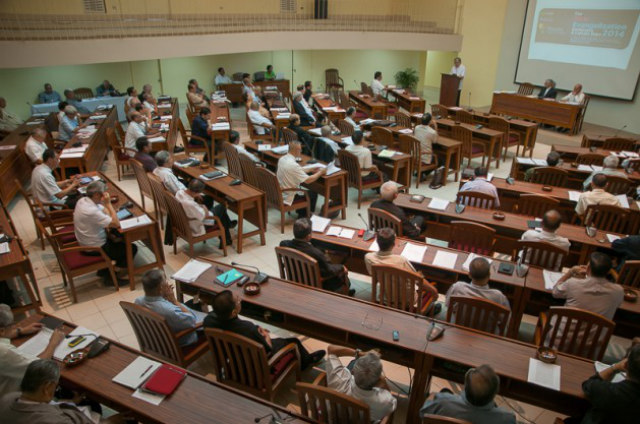SUMMARY
This is AI generated summarization, which may have errors. For context, always refer to the full article.

MANILA, Philippines – The head of the Catholic Bishops’ Conference of the Philippines (CBCP) pushed for “happiness” among prelates Saturday, July 5, as he sought to reform the Catholic Church’s “punitive” attitude in issues like contraception.
Lingayen-Dagupan Archbishop Socrates Villegas, president of the CBCP, explained that bishops should “walk in cadence” with Pope Francis, who himself is the Church’s “biggest challenge.” (READ: Lessons from the Pope who is ‘able to laugh’)
Francis, after all, “has slowly moved the Church from being a dogmatic, self-engrossed, and authoritative sick institution to being a gentle, outreaching, compassionate, and persuasive Church through the power of love and mercy.”
“Pope Francis challenges us to follow his example of humble and happy ministry,” Villegas said in his opening speech at the CBCP’s 109th plenary assembly, a twice-a-year gathering of bishops to discuss issues involving the Church, such as social justice when it comes to poverty and politics.
The CBCP president, who once drew criticism for denouncing contraception as “corruption,” said bishops can “reconsider” their approach in addressing Philippine issues. READ: On RH law, CBCP head takes cue from Francis)
‘Listen rather than condemn’
Stressing the need for positive instead of negative messaging, he delivered a litany of proposed reforms:
-
“Perhaps we can widen circles of integrity rather than creating fiercer watchdogs against corruption. Perhaps we need to remind ourselves that for every prophetic denunciation we utter we must stretch our hands to offer an opportunity for conversion and healing.”
-
“Perhaps we can reconsider our approach to solving the problems of family and life by listening more to the wounded and the grieving broken homes rather than condemning divorce and abortion and contraception at every opportunity. To keep healthy, one needs to stretch everyday. The body needs it, so does the heart and mind. Perhaps we can reach out to more people by stretching our minds and lowering our fences and listening like Jesus without being judgmental or punitive.”
-
“Perhaps instead of denouncing poverty and unjust social structures, we can talk more about the power of generosity and the promised abundance that God has promised to those who leave everything behind to follow Him. Perhaps we can fight poverty by embracing simplicity of life. If our stomachs know hunger by experience, the hungry and suffering poor will believe us.”

Villegas also said the Catholic Church “can be more convincing if we used the power of goodness and beauty rather than the brilliance of polemics and debates.”
He explained: “The cynics and skeptics will ask for baptism not by intelligent proselytism but by the sweetness of Christian exemplary living. After all, did not our grandmothers tell us that we can catch more flies with a teaspoon of honey than with a gallon of vinegar? St Francis said, ‘Go and preach the Gospel. Use words if necessary.’”
‘Christians demonize everything outside’
Villegas delivers a strong message in a country that has seen many abusive Catholic priests, especially when it was a Spanish colony.
Over the years, in fact, critics have caricatured these kinds of priests as “Padre Damaso,” a character in the novel Noli Me Tangere by the Philippines’ national hero Dr Jose Rizal, who portrayed priestly abuses.
Villegas’ message also resounds throughout the rest of the world.
It comes in the context of surveys like the one by the US-based Barna Group in 2011, which explored the reasons young people stay away from the Church. In the survey, 23% of respondents pointed out that “Christians demonize everything outside of the church,” while 31% said “church is boring.”
Like Villegas, other bishops have seen the need to reform this image.
In October 2013, Manila Archbishop Luis Antonio Cardinal Tagle said the youth get “turned off by a Church that is quite judgmental, a Church that comes across as pessimistic and heavy, that does not rejoice at anything, as though there is no sign of hope, not even a single sign of hope in the world.”
He called for a Church that has “the capacity to be happy.” (READ: Tagle: Youth want happy, not judgmental Church)
Referring to the youth, Tagle said: “They sort of expect the Church to say no to some things. But if they experience love and joy from us, then I think they are more disposed to listen to the no’s.”
Francis himself said: “The commandments are not a litany of prohibitions – you must not do this, you must not do that, you must not do the other; on the contrary, they are a great ‘Yes!’: a yes to God, to Love, to life.” – Rappler.com
Add a comment
How does this make you feel?
There are no comments yet. Add your comment to start the conversation.